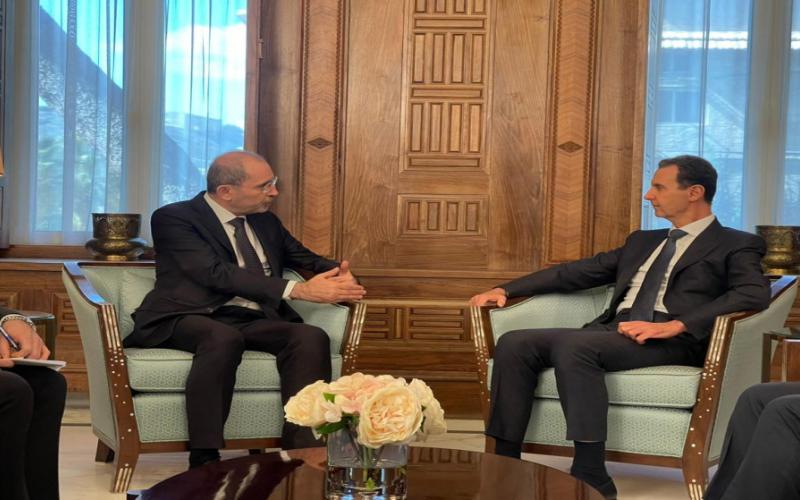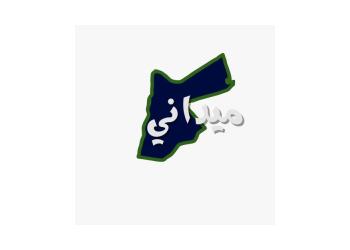- أمانة عمّان الكبرى تنتهي من تنفيذ مشروع تركيب كاميرات المراقبة على امتداد شارع الصناعة في منطقة البيادر
- وزيرة التنمية الاجتماعية، وفاء بني مصطفى، تقول الخميس، إنّ منصة "عون" الوطنية لجمع التبرعات تبدأ اليوم تشغيلها التفعيلي، بعد إطلاقها بصيغة تجريبية استمرت أسبوعاً
- وزير الإتصال الحكومي محمد المومني يقول إن الحكومة ستقوم اليوم الخميس بإرسال مشروع قانون قانون الضمان الاجتماعي الأردني إلى مجلس النواب، تمهيدًا للشروع في مناقشته تحت القبة
- اتحاد النقابات العمالية المستقلة، يصدر بيانا صحفيا الأربعاء، يطالب فيه بالعمل على رد مشروع القانون المعدل لقانون الضمان الاجتماعي الذي أقره مجلس الوزراء
- استشهاد فلسطيني وإصابة آخران، مساء الأربعاء، في قصف الاحتلال الإسرائيلي، شرق مدينة دير البلح، وسط قطاع غزة
- إيران والولايات المتحدة تباشران الخميس، جولة ثالثة من المحادثات غير المباشرة بينهما في سويسرا، سعيا إلى إبعاد شبح الحرب
- تتأثر المملكة، الخميس، بامتداد ضعيف لمنخفض جوي يتمركز شمال شرقي سوريا، حيث تنخفض درجات الحرارة قليلا؛ ويكون الطقس باردا وغائما جزئيا إلى غائم
Jordan’s foreign minister visits Damascus for the first time in years…a look at the history of Jordanian-Syrian tensions

Translated by Matthew Petti
Foreign Minister Ayman Safadi arrived at Damascus Airport on Wednesday while touring Syria and Turkiye to express solidarity with the earthquake-stricken countries. Safadi was hosted by Syrian president Bashar al-Assad.
Safadi’s mission was to discuss the humanitarian situation, as Jordan continues to provide relief aid on the orders of King Abdullah II, according to a statement by the Jordanian foreign ministry. Two more Jordanian aid planes were ready to depart for Turkiye and Syria on Wednesday, and land convoys continue to cross the border.
The visit to Damascus is the first official visit by a Jordanian foreign minister to Syria since the outbreak of the Syrian civil war in 2011. Safadi had previously met with Syrian foreign minister Faisal Mekdad in New York, on the sidelines of the UN General Assembly meeting in September 2022.
Jordan is again moving towards an opening towards Syria, the latest chapter in a story with many ups and downs, often marked by tensions between the two countries. The two feuding sister-countries are now trying to open the borders after a seven-year hiatus.
A history of tensions
Amman and Damascus have historically been part of opposing international alliances, and have traded accusations of undermining each other’s security, a conflict that continued through the ongoing civil war in Syria.
As the retired Jordanian military expert Mamun Abu Nuwar says, the relationship has been “in bad shape historically due to the two countries’ alliances, especially Syria’s close cooperation with Russia,” and “the political relationship will not be good even if economic ties come back.”
Nearly a century ago, skirmishes broke out between Jordanian and Syrian clans when King Abdullah I established Jordan’s borders with British assistance. The conflict deepened with the unification of Egypt and Syria into the United Arab Republic, and Abd al-Karim Qasim’s coup d’etat against the Hashemite monarchy in Iraq.
In 1958, Syrian fighter jets even tried to shoot down the plane of the late king Hussein ibn Talal, who was flying through Syrian airspace to the Swiss city of Lausanne, according to the late monarch’s 1975 memoir, Mon Métier de Roi.
Jordan deepened its partnership with the United States to protect itself, which put it at odds with the Syrian-Soviet alliance.
The relationship exploded in 1970 when the Syrian regime supported left-wing Palestinian factions against the Jordanian Army and occupied abandoned Iraqi positions in the Jordanian city of Ramtha. The Syrian forces withdrew after a four-day bombardment by the Jordanian Air Force, backed by the United States.
A decade later, the late Syrian president Hafez al-Assad accused Jordan of supporting an insurgency by the Muslim Brotherhood, in cooperation with Iraq’s Saddam Hussein. Jordan countered with accusations that Syria supported terrorism against Jordan.
Jordanian television aired alleged confessions by Syrian soldiers about a failed plot to assassinate Prime Minister Mudar Badran in 1981, as well as their participation in the summary execution of hundreds of Syria prisoners in Palmyra.
After the end of the Cold War, the two countries again found themselves in opposite blocs: Jordan joined the “Axis of Moderation” after the Wadi Araba Treaty with Israel in 1994, while Syria flew the flag of the “Axis of Resistance.”
In the early 2000s, fresh faces took power in both countries, and tensions began to dissipate due to shared economic and geopolitical interests. In 2009, the Jordanian government abolished departure taxes on Jordanian vehicles heading to Syria.
Soon after, the relationship deteriorated again due to the Syrian civil war. Damascus accused Amman of arming and training rebels, and facilitating the passage of jihadists to Syrian territory. Jordan expelled Syrian ambassador Bahjat Suleiman in 2014, and King Abdullah II implicitly called for Syrian ruler Bashar al-Assad to step down.
“Common sense dictates that somebody who is the figurehead of such bloodshed towards his people probably will move on,” the king said in a 2017 interview with the Washington Post, referring to Assad.
Amman and Damascus are again moving towards rapprochement today. Jordan, Egypt, and the Gulf states are seeking to bring Syria back into the fold of the Arab League.
Humanitarian aid as a window
Jordan has sent five planeloads of humanitarian aid to Aleppo International Airport, under the control of the Syrian regime, as well as several rescue teams and land convoys, according to Hussein al-Shibli, secretary-general of the Jordanian Hashemite Charity Organization.
The aid includes medicines, medical supplies, blankets, tents, winter clothes, food parcels, clean drinking water, and cash. Syrian users posted photos of Jordanian humanitarian food products for sale in earthquake-damaged Aleppo.
Jordanian exports to Syria increased by 23% during the first seven months of 2022, reaching JD 40 million, according to Jordan Chambers of Commerce statistics. However, this trade does not measure up to prewar figures.
Jordanian economists and activists tweeted about the need to break with the Caesar Act, a U.S. sanctions law passed in 2020 that disrupted trade between Jordan and Syria.
“The international sanctions on Syria must be lifted, and Jordanian-Syrian economic relations must return to the status quo ante,” wrote Musa Al Saket, a member of the Amman Chamber of Commerce.
The Trump administration signed the Caesar Act in 2020 in order to “prevent the Assad regime from securing a military victory.” The law includes exemptions for “humanitarian” goods, but also seeks to “deter foreign persons from entering into contracts related to reconstruction” in areas controlled by the Syrian regime.
The act was named for a defector who revealed information about atrocities in Syrian prisons.
Russian analyst Dimitri Brega believes that the Caesar Act is meant to “prevent Damascus’ move towards cooperation with other countries. The law punishes countries that cooperate with the Syrian regime, and does not prevent relief convoys form entering areas controlled by the regime.”
Brega added that the “problem is in northern Syria, such as Idlib, which is controlled by various armed groups. These areas suffer from a lack of aid.”
Al Saket, however, believes that the law hurts both Syrians and Jordanians.
“We, as a sector, have repeatedly demanded the lifting of economic sanctions on Syria. We had good trade going between us and Syria, and its return will benefit the two countries’ economies,” wrote Al Saket. “Before 2011, the trade between Jordan and Syria was JD 400 million, and today it is no more than JD 90 million. This is very economically harmful to the contracting sector, which had a chance to participate in Syria’s reconstruction.”
Al Saket explained that the Caesar Act causes difficulties for Jordanian companies that deal with Syria and also want to export abroad.
“This is unfair to our economy and the Syrian people,” he wrote. “Twelve years since the war broke out, more than 90% of the Syrian population lives below the poverty line, with limited access to food and medicine. This is a major catastrophe.”
A Jordanian source who spoke on condition of anonymity revealed that the Caesar Act was an obstacle to “the electrical connection between Jordan and Lebanon, which would pass through Syria, in addition to other obstacles such as the lack of financial coverage on the Lebanese side.”
Jordan asked for an exemption to the Caesar Act during King Abdullah II’s 2021 meeting with U.S. President Joe Biden in the White House. After the visit, the Jordanian-Syrian land border was reopened, but the volume of trade did not live up to the hopes of traders in the two countries.
The Syrian opposition’s perspective
The U.S. government and the Syrian opposition deny that the Caesar Act hurts ordinary Syrians.
“Our sanctions programs do not target humanitarian assistance, and allow activities in support of humanitarian assistance, including in regime-held areas,” the U.S. State Department wrote in a statement last week. “The United States is committed to providing immediate, lifesaving humanitarian assistance to help all affected communities recover from this disaster.”
Darwish Khalifa, a journalist and member of the Democratic Arab Center, argues that the Syrian regime bears more blame for Syrians’ suffering.
“The law does not affect the Syrian people. If the regime submits and sits at the negotiating table with the opposition, along the lines of UN Security Council Resolution 2254, the Caesar Act will be lifted,” he said. “The sanctions do not affect the people as much as the Syrian regime does, by refusing to implement a transitional government, a new constitution, parliamentary and presidential elections, and the safe return of the Syrian diaspora.”
Khalifa noted that the U.S. Treasury has eased sanctions on Syria, allowing civil society organizations to move money more easily. He added that the West fears the regime will abuse aid to benefit pro-government militias and Maher al-Assad, leader of the Fourth Division, who is accused of corrupt activities.
American affairs expert Daoud Kuttab counters that the Caesar Act has had a “devastating effect on the Syrian people, and not the regime.”
“Assad is still in power, backed by Iran and Russia, but the Syrian people have suffered a lot because of the sanctions, as have neighboring countries like Jordan, which suffered from the closure of borders and cessation of trade,” he said. “The sanctions efforts have failed to gain the compliance of other countries, especially in the last few days, as the catastrophe that struck Syria led many to provide direct support to the Syrian people and break the siege by sending planes.”
Last Thursday, a coalition of popular leftist and nationalist groups called on the Jordanian authorities to “lift the U.S. blockade on Syria,” stating that “it is necessary to cancel the so-called Caesar Act, imposed by the U.S. administration on Syria in order to destroy its economy and increase its people’s suffering.”
“We demand that all popular Arab forces move to form a popular Arab front pressuring their governments to break the siege on Syria,” the statement added.
Official hopes for the stabilization of Syria
For its part, the Jordanian government hopes that the situation in Syria will stabilize, according to Faisal Al-Shboul, government spokesman and Minister of Government Communications.
Jordan’s priorities are that “the situation in Syria should stabilize, and the crisis should end, and the people there should decide on their future,” he said.
“This crisis had and continues to have repercussions. We have 1.3 million Syrian refugees to whom Jordan provides healthcare, education, and all services despite limited resources, such as water,” Shboul added. “The international community has failed us in responding to the Syrian crisis, as its annual contribution is no more than 23% of the amount required to care for the Syrians.”
He named the United States, Russia, Iran, Israel, and Turkey as the “multiple parties in the Syrian crisis.”













































